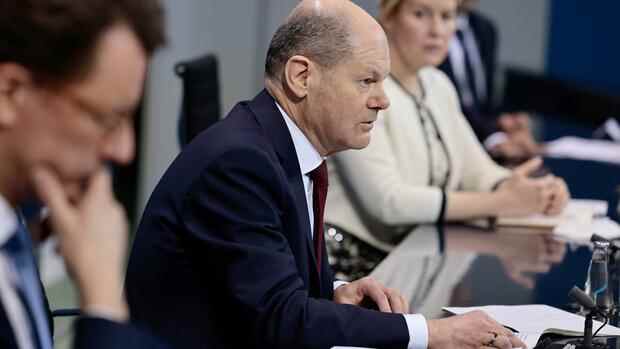Olaf Scholz claims to see things from the end, like Angela Merkel. But the Chancellor is currently not living up to this claim. Instead of a policy of long lines heading towards a clear goal, Scholz is pursuing a policy of whoops in the corona crisis that ends up in a dead end. Or he is perceived as a brakeman, as in the Ukraine crisis.
Slowly but steadily, the Federal Chancellor is losing the authority that he acquired so impressively with his historic “Zeitenwende” speech at the end of February.
Before taking office, Olaf Scholz made a pithy surprise by announcing that he wanted to introduce compulsory vaccination. However, he himself made a slim foot because of the resistance of the FDP by declaring the vote in the Bundestag to be a question of conscience. The obligation to vaccinate ruthlessly exposes the internal conflicts that were already present when the coalition was formed, but which have so far been whitewashed by the war in Ukraine: the FDP’s desire for freedom on the one hand and the desire for state intervention by the SPD and the Greens on the other.
In the end, Scholz failed because of his evasion of responsibility and the traffic light because of its own hubris, as the undignified Bundestag debate revealed. After the defeat in the referendum, there is no vaccination requirement at all, although Scholz grotesquely had the foreign minister fly in from the NATO meeting to Berlin for the vote. The Chancellor did not lead when it came to compulsory vaccination, but let the FDP lead him into a disaster.
There are also problems in the cooperation with the countries. Scholz’ Health Minister Karl Lauterbach keeps causing a stir with Volten. But the chancellor himself has also been criticized for his corona policy. Now the federal and state governments are still stuck on the refugee costs, and the SPD prime ministers are also anything but good at speaking to their chancellor. Here, too, the approach of the Chancellery does not seem very planned, although Scholz supposedly always has a plan for everything.
Top jobs of the day
Find the best jobs now and
be notified by email.
A picture that is not quite as bad, but is becoming increasingly gloomy, also emerges in the Ukraine war. With his speech on the turning of the era, the chancellor himself aroused the expectation that Germany would now assume the leadership responsibility that the country has long since had de facto due to its size, geographic location and economic strength.
But since his speech, Scholz has apparently been afraid of heights. The Chancellor is approaching the point where he stood before his speech. In parts of Europe he is again perceived as a procrastinator. Germany is acting too slowly, if at all, and only when the hesitation has already caused damage.
The SPD politician is in a quandary.
(Photo: IMAGO/Bernd Elmenthaler)
Scholz is caught in a trap from which he has no right way out. On the one hand there are the legitimate demands of those who are demanding tougher sanctions. If the West’s aim is to support Ukraine’s right to self-determination and thus thwart Putin’s invasion, time is of the essence. The West would then have to deliver arms immediately and on the largest possible scale. And he might also need to impose a comprehensive oil and gas embargo.
>>Read also: Scholz on arms deliveries to Ukraine: “We deliver what we can”
Recently, southern European politicians have even drawn more and more comparisons with the euro crisis. Just as Greece maneuvered itself into a dead end with its lax financial policy, Germany maneuvered itself into a dead end with its energy policy. During the euro crisis, Germany prescribed shock therapy for the reeling countries. If you apply this recipe to Germany, Berlin would have to end energy imports abruptly, even if that leads to a deep recession, according to the logic in southern Europe.
However, this comparison also lags. Germany is not a small peripheral country, but as the largest economy it is an anchor of confidence in the currency area. And while many EU countries are making pithy demands in the Ukraine war, they also like to hide behind the big Germany.
Every further step is undeniably associated with high risks. This by no means only applies economically to Germany in the event of a more comprehensive energy embargo, the consequences of which nobody can foresee. Even import taxes on Russian energy imports would be a poker game in which the stake is the euro shortly before the French elections with an ever stronger Marine Le Pen.
The situation is undoubtedly difficult, but Scholz urgently needs to get out of the role of the driven. The damage to reputation that would otherwise threaten could be great – and as the political costs of the war weigh heavily on Germany for a long time to come.
More on this: Chronicle of failure: Bundestag votes clearly against compulsory vaccination from the age of 60
